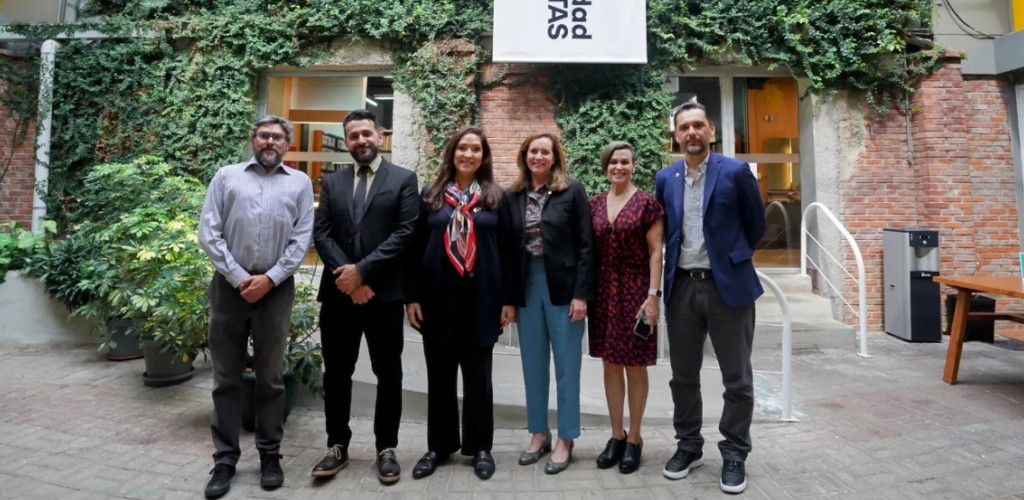
Behind the scenes - Project "Eliett" created by Jessica Valderrama, LCI Bogotá
Published by LCI Education, February 5th, 2018
We interviewed Jessica Valderrama from LCI Bogatá about her creative process for her project "Eliett".

CCE Hub CR: Fact Sheet
Who? LCI Veritas, funded by the Coalition for Climate Entrepreneurship (CCE) (established by the US Department of State) and facilitated by Pvblic Foundation and CleantechHub.
What? CCE Hub CR, one of a growing number of CCE Hubs located in key regions worldwide that act as local centres for engagement, offering training, mentoring, pitch competitions, and maker spaces.
Where? LCI Veritas, San Jose, Costa Rica.
When? Over the next 2+ years, beginning April 2024.
The necessity of prioritizing climate solutions in innovation cannot be overstated. For educators, professionals, and entrepreneurs, tackling complex climate issues demands multifaceted, intersectional approaches. Effective initiatives must blend local and global opportunities to drive meaningful change.
One major obstacle to impactful solutions is funding. Large-scale solutions require significant financial resources, and few individuals can support such initiatives without ongoing financial backing.
To address this, the Coalition for Climate Entrepreneurship (CCE) is establishing Hubs in key regions of the world to empower solution-focused entrepreneurs and to draw investors to viable climate startups.
LCI Education discusses the program with Ivan Delgado Salazar, CCE Hub General Coordinator, who explains its role as a sustainable business incubator in promoting climate solutions and fostering social responsibility.
Ivan, can you tell us about CCE Hub CR? What is it exactly?
Alongside its academic operations, the LCI Veritas campus in San Jose, Costa Rica, is now a regional, two-year (minimum) sustainable business incubator.
With the support of the larger CCE Hub program, the Hub encompasses ideation, incubation, and acceleration programs for climate solution-focused entrepreneurship.
LCI Veritas won the grant! It was one of those moments when you become aware of how we are positively impacting our context.
How does the program work?
The CCE program, a coalition funded by the US Department of State and partners from the private sector, and facilitated by the Pyblic Foundation and Cleantech Hub, leverages LCI Veritas's resources and position to engage stakeholders across sectors.
LCI Veritas provides its installed capacity (facilities, human resources) and its referential position in the Costa Rican context to invite stakeholders from different sectors to participate as trainees, mentors, funders, and supporters for the different programs.
The program involves Ideation, Incubation, and Acceleration components that function semi-independently to provide targeted support to interested groups with various entrepreneurial experience:
What are the overall goals of the program?
One goal is to encourage nascent ideas and support start-ups and expanding enterprises from various sectors that provide climate solutions and promote a strong sense of responsibility towards society.
Another goal is for LCI Veritas to become part of and help build Costa Rica’s existing ecosystem of entrepreneurs and organizations, which does not yet necessarily work cohesively in cleantech and innovation sectors.
It sounds like a very exciting project! To what extent will current or potential LCI Veritas learners be involved?
Our learners get information first and more directly than other members of the public, and we are encouraging combining course assignments with the goals of the program. Ideally, we’ll have LCI Veritas participants in both the Incubation and Ideation phases.
What was the application process like?
We were invited to join the coalition applying to the US DOS for a single CCE grant for the whole of Latin America. I was approached by Juanita Alvarez, Pvblic Foundation’s Program Officer for Latin America and the Caribbean, because of my involvement as a board member with the Green Building Council Costa Rica, where LCI Veritas is the only associate from the academic sector.
LCI Veritas won the grant! It was one of those moments when you become aware of how we are positively impacting our context. We are now one of the very few universities in the country that have a business incubator.
Why was LCI Veritas selected for the important role of CCE Hub for Latin America?
We have been on the radar in the region because of our participation in several country-wide consultation processes and projects directly related to sustainable design and construction.
Also, LCI Veritas is increasing its reputation as one of the most serious universities in the country. We have been in the news (tv news and programs, newspapers) for very good reasons. We are an institution where design, business, sustainability, and innovation come together in a unique way in the country.
We also have a very cohesive team, a good combination of tradition and agility and a nice balance in size in general: not excessive as to be inefficient, but enough to reach critical mass for real impact in projects like this.
Pvblic Foundation was interested in our facilities (meeting spaces, labs, auditorium), faculty, and curriculum. The CCE Hub CR project “borrows” our credibility and leading position in the country (the program looked for well-respected Universities in Latin America), and in return, provides our team with specific training. This trainer-training aspect will enable us to continue the program beyond its 2-year duration or begin other similar programs.
What guiding principles, values, or criteria does LCI Veritas have going into the project?
The CCE Hub CR project aligns with our mission to train good citizens of the country and the world, and we are applying all-encompassing design principles to every step of the program.
Our opportunity is to connect with the full potential of the project by giving the best use possible to the resources channeled through laudable organizations such as Pvblic Foundation and to amplify Costa Rica’s and LCI Veritas’s commitment to the protection of the environment.
What is the significance of the program for Costa Rica and Latin America?
It means that as a region, Latin America has a lot of potential for economic growth based on environmentally responsible and scalable solutions. For Costa Rica, it means that the country is regarded as a leader in sustainable development in the region, with several challenges particularly in relation to making that development more equitable. This project is intended to be an example of how these challenges can be addressed.
The main benefits of the program are innovative solutions against climate change and the potential for economic growth across diverse social settings in Costa Rica.
Ideally, the program contributes to a renewal of the business fabric in Costa Rica, with a bottom-up and inclusive approach (women, indigenous population, vulnerable sectors), and drives change in local financial institutions and the public sector in general.
Promoting sustainable habits in consumers and across many stages of the value chain is also very desirable.
Are there any specific climate-related concerns LCI Veritas hopes to address?
We understand that given the urgency of the climate crisis, we cannot separate education from environmental stewardship.
Balancing top-down policy and day-to-day reality is difficult anywhere. Sometimes policies designed to protect become too abstract for citizens, farmers for example, trying to make a living.
CCE Hub CR has the potential to strike a balance in responsibility between Costa Ricans and policy makers. Everyone makes economic and other decisions that impact the environment and it’s not always easy to prioritize sustainable actions. The CCE Hub program is an opportunity to support entrepreneurial solutions that make it easier for everyone to contribute to sustainable solutions in our everyday activities.
So then what kinds of things are you looking out for, or prioritizing, or ensuring when fostering startups? What do you want to see considered by startups in the program?
One aspect to consider when there is money involved, there is always the risk of choosing economical over environmental benefit. For that reason, environmental responsibility is non-negotiable from the very inception of the startups. It must be embedded in startup mission and value statements.
There are now more precise ways to estimate the cost of any negative environmental a product or service may have. For example, Cleantech Hub has a very robust methodology for measuring the impact of solutions, detecting greenwashing, and anticipating conflicts of interest. So, weighing the environmental impact of a less-responsible service or product in economic terms gives the more responsible solution a head start.
How might insights from the CCE Hub CR process/program be incorporated in LCI Veritas events, curriculum, experience?
We are hoping to host a Climathon or similar event in September, as well as the national Incubation finals in September. We are taking cues from the program to strengthen the sustainability and business components in our soon-to-be reformed curricula.
I think participating in CCE Hub CR could strengthen LCI Veritas’s recently relaunched business school, and I hope it also strengthens our relationship with our alumni and with our mission as an institution that incorporates sustainability in all aspects of the education it provides.
What kind of participation or involvement might LCI Veritas need from the rest of the LCI Community?
Given the geographic specificity of the program, direct participants must have their startups based in Costa Rica; however, we would be very excited if the news spread across the LCI Community, and perhaps similar actions start to take place at other campuses. And of course, helping us spread the word would be extremely helpful!
What are next steps?
Running the program for the rest of the year and through 2025.
Good luck, Ivan! We can’t wait to hear more!
Thank you! Follow LCI Veritas on social media for updates on our progress!